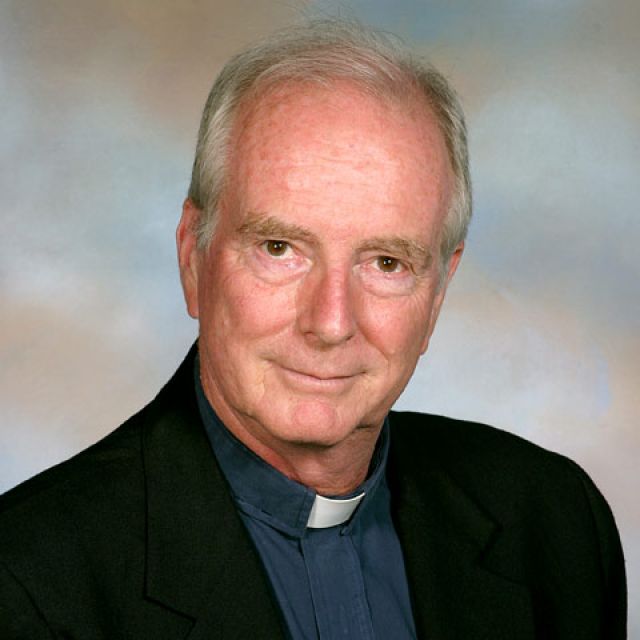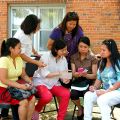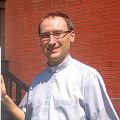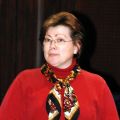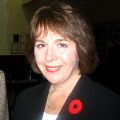Every Jesuit chooses poverty. They all vow to live their lives poor, chaste and obedient. But Fr. Jim Webb kept choosing poverty – over and over.
The former provincial superior of the Jesuits in English-speaking Canada died 6:30 a.m. Thursday, Aug. 9 surrounded by his Jesuit brothers in Rene Goupil House, the Jesuit infirmary in Pickering, Ont. A long dormant cancer came back and metastasized, forcing him to resign as provincial superior and enter palliative care in May, 2012.
"One of the things that was most amazing about watching him the past few months was that, regardless of what was going on with his body, there was a radiance in his face. He was very much at peace," said Jesuit Fr. Philip Shano, the director of Rene Goupil House.
As provincial superior Webb moved out of the six-bedroom home in a leafy west-end Toronto neighbourhood which had once served as home base for the Jesuit leadership team. He and his socius moved into a small apartment in St. James Town – Canada's most densely populated neighbourhood and one of the poorest parts of Toronto.
Living his vow of poverty among poor people was important to Webb.
"If you say that material things are not important but then there's no sign of it, it lacks credibility," Webb told The Catholic Register in 2009. "Our commitment to social justice and solidarity with the poor is very strong. In terms of vocations, I think that is one of the things that is attracting younger people to the Jesuits."
But moving into St. James Town wasn't the first time Webb chose a more unambiguous sort of poverty. In over twenty years of service in Jamaica, the elegantly educated Canadian chose to spend every minute he could with the poor. Between 1986 and 2008 he was pastor of St. Peter Claver Church in Kingston, chair of the St. Mary's Rural Development Project, founding director of Citizens Action for Free and Fair Elections and regional superior of the Jesuits in Jamaica. In 2009 he received the National Union of Co-operative Society Award for helping to found the St. Peter Claver Women's Housing Co-operative.
He always believed there was more that could be done, however difficult it might seem, said Shano.
"Where others saw missions impossible, Jim was eternally optimistic about how things could work out," he said.
As superior in English Canada, Webb responded generously to the request for a greater Jesuit presence in Vancouver. It was a decision that may yet stretch Jesuit resources thin elsewhere, but thin resources and trusting in God make up a good portion of what it means to be poor.
Webb chose to live among the poor and work for the poor as soon as he was ordained in 1973. He and Jesuit Fr. Michael Czerny moved into South Riverdale just east of the Don River, long before gentrifiers began installing wine cellars and stone countertops in what had once been crowded boarding houses. There he helped found the Jesuit Centre for Social Faith and Justice, became a founding director of the Taskforce on Churches and Corporate Responsibility, helped get The Catholic New Times newspaper up and running, worked to bring the South Riverdale Community Health Centre into existence and founded the Canadian Alternative Investment Co-operative.
Of his 68 years, Webb spent 48 living the vows of poverty, chastity and obedience. He was born in Halifax to J. Hilus Webb and Mary Somers July 29, 1944. He earned a B.Sc. from St. Francis Xavier University in Antigonish, N.S. before entering the Guelph, Ont. novitiate in 1964. He made final vows in 1979 and along the way studied philosophy at Gonzaga University in Spokane, Wash., taught high school at Brebeuf College in Toronto and studied theology at Regis College in Toronto.
In January of this year, as his own cancer spread, Webb was at Fr. Bill Addley's side when Addley died.
"He said that in those few minutes in the hospital as Bill died he realized that Bill was teaching him how to die," said Shano. "I noticed this Sunday, the (Feast of the) Transfiguration, you could look at Jim and see him being so, almost literally and physically, transparent because he was so thin. But his face still shining."
Webb was consistent his whole life long, said Fr. Michael Czerny – one of Webb's closest friends for 50 years.
"Jim understood that the Gospel drove us out into those worlds where, by being honest and helpful, we could encourage others to know God's love in their lives. This he did, his life long, and this he inspired many young Jesuits to do, too," said Czerney in an email to The Catholic Register
Ministry gives care to the caregivers
By Evan Boudreau, The Catholic RegisterTORONTO - Each Sunday laughter, Tagalog chatter and tear-drenched tissues fill the pastor’s lounge at Our Lady of the Assumption Church.
That’s where about 20 women meet each week for the Live-in Caregivers’ Ministry that runs out of the parish in the Bathurst and Eglinton area of Toronto. All of the women have families in the Philippines that they have left behind to work as nannies in Toronto. The ministry was formed to help ease the suffering caused by separation from their loved ones thousands of kilometres away.
“Every day is a struggle for me because I am not happy any more,” said Riza San Pedro, a 34-year-old live-in caregiver. “What I am doing for me to cope is in the morning I’m just reading some passages in the Bible and sharing it with some of my friends through texts. Then in the evening I’m praying the rosary. That’s every day.”
Prior to coming to Canada in 2009, San Pedro worked as a nurse. Now she’s a nanny, a single mother of two and separated from everyone she knew back home in the Philippines — including her family who she supports by working abroad.
San Pedro came to Canada through the federal government’s Live-in Caregiver Program. Since her arrival, San Pedro has bounced from abusive employer to abusive employer while constantly seeking some sense of comfort.
“I was trying to find a church that could understand a caregiver like me and what I’m going through,” she said, a search that lead her to Our Lady of the Assumption and the Live-in Caregivers’ Ministry which has helped her to rediscover dignified employment, self-esteem and friends she can relate to.
“All of them have their children in the Philippines. They’re all sacrificing over that and they have different ways of coping with that loneliness that they feel from being away from their children,” said Faye Arellano, the ministry’s volunteer co-ordinator. “It’s almost like an extended family (here). Everyone can relate to each other, even in their problems.”
Formed three years ago, the ministry was originally named the Grass Roots Hub but quickly rebranded itself as the Live-in Caregivers’ Ministry to provide greater clarity for caregivers seeking a consoling outlet. This comforting happens through Bible study, socializing and accessing the Internet which many use to communicate with the family they’ve temporarily left behind.
“I take my hat off to them for having that strength and bravery to just focus on their purpose for coming here,” said Arellano, adding the women’s goal is permanent residency in Canada and eventually bringing their families here. “For most of them it’s that they want to provide their families with some food on the table and even the basic needs that their family requires.”
The government’s Live-in Caregiver Program, which underwent adjustments in 2010, offers what Manuela Gruber Hersch, president of the Association of Caregiver and Nanny Agencies Canada, called “a very generous immigration path to become permanent residents.” She says this with authority having emigrated from Austria as a live-in caregiver while a teenager — but things were much different then.
Today a six-month caregiver course is required before entering the immigration program. Graduates can then use agencies, such as those represented by Gruber Hersch, to find an employer in Canada who must pay travel costs at no penalty to the employee. Once here, employees must complete 3,900 hours of work, 10 per cent of which can be overtime based on a 37.5-hour work week, within a minimum of 22 months and maximum four years. Upon meeting these conditions, they can apply for an open work permit which allows them to move out of their employer’s home, and the caregiver industry if desired, as well as apply for permanent residency.
These reflect some of the policy changes that came into effect April 1, 2010 which sought “to protect live-in caregivers from abuse and exploitation and make their transition to permanent residence simpler,” said Bill Brown of Citizenship and Immigration Canada.
As these policies were developed during Immigration Minister Jason Kenney’s 2009 coast-to-coast consultations with caregiver agencies, media outlets began publicizing the struggles of these workers, who are almost exclusively women.
This heightened attention struck a nerve at Our Lady of the Assumption, prompting pastor Fr. Ben Ebcas Jr. to call upon his parishioners to form a ministry.
“He called a community meeting asking people what can we do about our suffering caregivers and that’s where I first started getting involved,” said Arellano. “We thought the church would be good to step into that, to step up to the plate, because as Catholics this is really the only way to live the Gospel challenge of really helping the marginalized. From there on it’s just built up.”
Now Arellano assists about 20 caregivers on any given Sunday, some who aren’t even Catholic but still find relief with the ministry. That number swells to more than 45 when events are held at the parish by the Archdiocesan Filipino Catholic Mission, of which the ministry is a branch.
While an absence of family is the common thread of sadness for these workers, it is not their only struggle. Many, like San Pedro, suffer work-related problems ranging from abusive conditions to self-esteem issues derived from a sense of social status demotion from becoming a nanny.
“Everyone would acknowledge that they are going through a tough time but alas, because of this faith that we believe in, even suffering takes on a different meaning,” said Arellano.
Four tales of hardship, separation
Meet four women from the Philippines working abroad as live-in caregivers. While their experiences in Toronto are different they share a hardship — sacrificing family life to provide for those they love and left behind.
This suffering brings them back to the Live-in Caregivers’ Ministry every Sunday where they temporarily find relief from the pain. Here are but four stories of many as told to The Register’s Evan Boudreau: the good, the bad, the unjust and the tragic.
The good
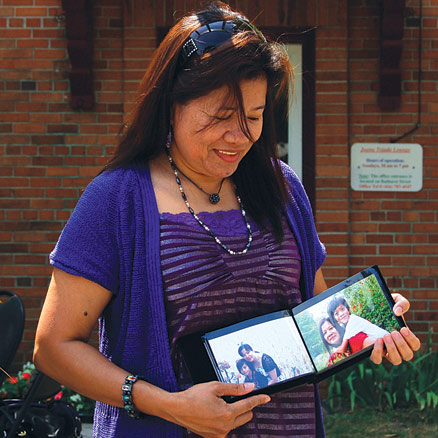 At 46 years of age, Gina Magcalas has already spent half her life working abroad, including all 12 years of her son’s life.
At 46 years of age, Gina Magcalas has already spent half her life working abroad, including all 12 years of her son’s life.
“In the Philippines it’s hard to find a job,” said Magcalas, who holds a bachelor of commerce and specialized in accounting. “After I graduated I applied (for jobs) and they always asked you where is your background. How can I have ... experience with a job if they will not accept me.”
This forced Magcalas to search elsewhere for work. She began working abroad as a nanny travelling to Abu Dhabi, Hong Kong and now Canada, the furthest she’s been away from her son Ralph Jacob.
Magcalas medicates homesickness by cladding her living quarters with photos, most of them containing her son.
Despite this hardship of the heart, Magcalas considers herself fortunate.
“I’m one of the lucky nannies who came here (because) I have a good employer and nice accommodations,” said Magcalas, who lives with a middle-aged couple and their four-and-a-half-year-old son Finnigan. “My employer told me if I wanted to go home I can but I said I wanted to wait until I got my open work permit.”
So when Magcalas received her permit last December she immediately bought a plane ticket to attend her son’s elementary school graduation in April. It had been four years since they last saw each other.
Now back to work in her employer’s St. Clair Avenue West and Bathurst Street home, Magcalas is anxious to receive permanent residency status and sponsor her son’s immigration to Canada.
The bad
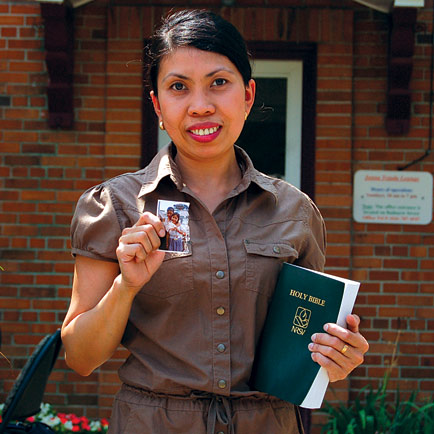 When Riza San Pedro decided to come to Canada she mistakenly thought it would be a paradise.
When Riza San Pedro decided to come to Canada she mistakenly thought it would be a paradise.
“I’d heard that Canada is a very good country with more opportunities when it comes to jobs,” said San Pedro, who first worked abroad in Saudi Arabia as a nurse for five years. “But when I came here I was not so lucky because I struggled with employers. That first two years living here was like a living hell because I struggled to find a good employer.”
Her last employer restricted food consumption, had her sleeping near the furnace and required her to scrub 10 washrooms twice a week. Then when San Pedro gave her two weeks notice on a Tuesday, they told her to leave that Friday.
But hardship isn’t new to San Pedro.
“The reason why I left (the Philippines), well it’s kind of personal. I had a very bad marriage — a nightmare,” said San Pedro, 34. “When my second child was born that’s when (my husband and I) really got separated.”
Receiving no child support San Pedro knew that a nurse’s wage in the Philippines, about $400 a month, wouldn’t cut it. As a nurse in Saudi Arabia her wage tripled but the government offers only a six-year foreign worker’s permit. So San Pedro swallowed her pride, gave up her career and enrolled in the Canadian government’s Live-in Caregiver Program with the goal of permanent residency in Canada.
That was three years ago and due to her unstable employment, San Pedro still faces several years before she can sponsor her children, aged 11 and 9.
“It’s really frustrating,” she said with tears welling in her eyes. “Actually you cannot explain the feeling.”
The unjust
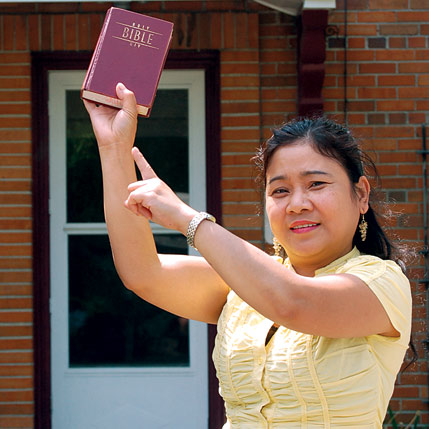 When Winnie Cuento left her husband and three children in 2005 she never thought her permanent residence status would be jeopardized by her eldest daughter.
When Winnie Cuento left her husband and three children in 2005 she never thought her permanent residence status would be jeopardized by her eldest daughter.
“I received a letter (from the Canadian embassy in the Philippines) ... and they put your daughter is mentally retarded,” said Cuento, explaining why her permanent residency in Canada has been denied. “It’s hard for me because I know my daughter isn’t retarded. She is only a slow learner.”
When applying for permanent residency a medical evaluation of the applicant’s dependent family members is required to determine their potential strain on Canada’s social services. Regulation 72 (1)(e)(i) of the Immigration and Refugee Protection Regulations states “a foreign national in Canada becomes a permanent resident if, following an examination, it is established that they and their family members, whether accompanying or not, are not inadmissible.”
Another letter, sent by Citizenship and Immigration Canada, explained that her daughter’s medical condition, this time labelled developmental delay, “exceeded the average Canadian per capita health and social services cost, which is currently set at $4,806 per year.” According to the Ontario Ministry of Education, Cuento’s 16-year-old daughter would require Intensive Support Amount Level 2 special education, costing $12,000 per academic year, thus exceeding the average demand and making her inadmissible.
“It’s hard for me at this time because they refused my papers and I worked so hard,” said Cuento, who appealed the decision by submitting an “individualized plan to ensure that no excessive demand will be imposed on Canadian social services,” an option contained in the letter from CIC.
Despite offering to pay the education costs, Cuento’s appeal was denied. To make matters worse, her work permit expired.
The tragic
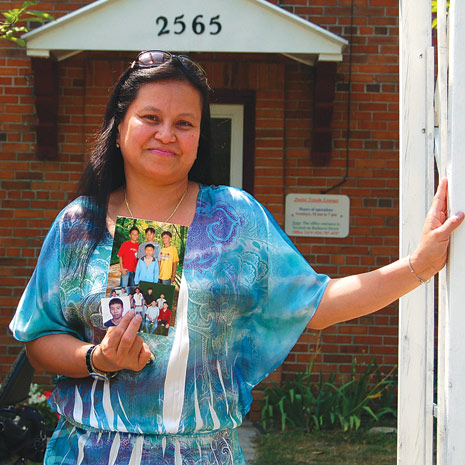 The second time in six years Marife Gamino went home to the Philippines, she buried her eldest son Alfred.
The second time in six years Marife Gamino went home to the Philippines, she buried her eldest son Alfred.
“That was a very hard time when I saw him in a casket,” said Gamino, who began working abroad as a live-in caregiver in 2005 to support her family. “I was never expecting that to happen to me last year in 2011.”
A motorcycle accident hospitalized Alfred just months before he was to complete his degree in human resource management. Being halfway around the world in Canada, all Gamino could do was call.
“He could not move but I knew that he heard me when I called on the phone because my sister told me and my other son told me ... he cried when I talked to him on the phone,” said Gamino, 44.
Less than 24 hours later her son, then 20, died.
“Since that has happened . . . I am stuck crying.”
But tears won’t feed her three other children, husband and parents who she financially supports. So after the funeral Gamino said goodbye again and returned to her job in Canada. Her heavy heart finally got some relief on Dec. 7 — the date her late son would have turned 21 — when she received her open work permit after waiting 18 months.
“Now I’m still hoping for that permanent residence so I can bring my family,” said Gamino, who credits the Live-in Caregivers’ Ministry for her strength. “They were praying for me, for my family, so I kept strong. I’m still strong (and) today I still survive.”
Newman Centre’s new pastor not there to reinvent the wheel
By Vanessa Santilli-Raimondo, The Catholic RegisterTORONTO - As the new chaplain at the Newman Centre, Fr. Chris Cauchi is looking forward to serving the spiritual needs of students at the University of Toronto.
“Newman is such a vibrant place,” Cauchi told The Catholic Register. “I’d like to first observe what’s going on, learn, and I’m very blessed I don’t have to reinvent the wheel. Many priests and laypeople before me have already laid the foundation.
“My hope is to be able to nourish and support that growth that is going on here.”
Cauchi moved into the Newman Centre June 27, taking the reigns from Fr. Michael Machacek. He’ll also serve as pastor at St. Thomas Aquinas Church, located just next door to the Newman Centre.
Cauchi, who turned 32 on Aug. 11, was first assigned to be associate pastor at St. Barnabas parish in Scarborough, where he helped co-ordinate the youth ministry. When he moved to St. Michael’s Cathedral two years later, he was involved with the young adult ministry along with being the assistant chaplain for Ryerson chaplaincy.
Born in Canada, his family decided to move to its native Malta when he was three years old. It was in Malta where he entered the seminary.
“We have the policy of the internship year,” said Cauchi. “We have to do it outside of the diocese, so being Canadian, I thought it would be good to do it here.”
He returned to Malta for his theology but his diocese of Gozo has a policy where you must serve abroad for at least two years after ordination.
“So in my case I came here and from two years it became seven and I’m still here. And I like it.”
His appointment to Newman came as a surprise, he said.
“But I’m very glad to be here.”
His role will comprise three components: the parish, the residency formation program and the chaplaincy outreach to students, he said.
“I want to emphasize my mission would be to try to make justice with the three of them.”
The challenges of the job will reflect the challenges of every Catholic, said Cauchi.
“How can we remain rooted in the tradition of the Church? How can we grow personally and communally in our relationship with Christ? How is Christ calling this community to leave behind what’s familiar and go to the unfamiliar territory that Christ may want us to be?
“These are some questions that every believer needs to focus on, that our community is focusing on. And I think the Holy Spirit will continue to guide this community and this process of change.”
New work the age-old story of redemption
By Michael Swan, The Catholic RegisterTORONTO - If people mistake the new larger-than-life crucifix at Edmonton’s St. Joseph College for something old it won’t bother Toronto artist Gregory Furmanczyk.
Furmanczyk is getting ready to ship his new sculpture to Edmonton for an official unveiling some time this fall. The crucifix, with a corpus of hardened plaster made to look like marble hanging on a wooden cross, was commissioned by Edmonton Archbishop Richard Smith for the new chapel at St. Joseph’s Seminary.
“It’s the age-old image of the story of redemption,” is how Furmanczyk describes his new work.
Smith and the seminary gave Furmanczyk leeway to produce a piece of liturgical art that would be unique.
“Firstly, I did it as my own expression,” he said. “You create something you want to create.”
While the artist makes no bones about paying homage to Michelangelo and 17th-century masters, he chose to emphasize the redemptive peace of Christ rather than suffering on the cross.
“I wanted to project a feeling of peacefulness and mysticism,” he said.
He likens his crucifix to Michelangelo’s famous Pieta.
Furmanczyk is best known as a portrait painter of official, public figures — from Heather Smith, the first female Supreme Court of Ontario Chief Justice, to Alvin Curling, the first black Speaker of the Ontario Legislature. But he has also built a career as a sculptor and painter of religious works. His Jubilee Cross was the centrepiece of Jubilee 2000 celebrations in the archdiocese of Toronto. He has painted a traditional icon of Christ the Pantocrator for Toronto’s Our Lady of Sorrows parish and has provided stations of the cross to St. Marguerite D’Youville in Brampton, Ont.
King’s students experience life on reserve
By Erin Morawetz, The Catholic RegisterBy the time Alexandria Lepore was finishing up her honours degree in Catholic studies and history from King’s University College in London, Ont., this spring, she knew she wanted to become a youth minister.
So when the opportunity came up to take a 12-day trip to do some youth programming, she jumped at the chance.
“It just sounded like the perfect opportunity to feel out what the job would be like,” Lepore said.
But this was no ordinary trip. Lepore and 13 other students, 11 from King’s College, two from St. Peter’s Seminary, along with Fr. Michael Bechard and Sr. Susan Glaab, headed out on June 28 to the Fond du Lac Denesuline First Nation reserve in northern Saskatchewan, close to the border with the Northwest Territories. It took three planes from the southwestern Ontario city to reach the reserve, located on Lake Athabasca, 1,275 km northwest of Prince Albert.
Bechard, director of campus ministry and chaplain at King’s, had visited the reserve the summer before with Glaab, and decided to organize this trip.
“I thought it would be a wonderful opportunity for some of our young people to work with some of the young people up there and be involved in some sort of exchange,” he said. “They saw a part of Canada that very few Canadians will ever see.”
The group spent the better part of a week on the reserve, getting to know the community and joining its members in prayer. Then, they accompanied the Fond du Lac people on a 40-minute boat ride to a little island called Pine Channel. It is there that Bishop Murray Chatlain of the diocese of Mackenzie-Fort Smith — and a graduate of London’s St. Peter’s Seminary — leads an annual pilgrimage for the Fond du Lac people along with two other nearby nations.
Chatlain, with assistance from Bechard, led the adults in liturgical and devotional experiences while the students from King’s focused their attention on the kids, leading activities and crafts, and providing different educational programs.
Lepore, a youth minister at King’s, has plenty of experience working with children. But this time, she said, was different — simpler, less structured.
One day, she said, she was trying to lead the children in an activity of making knotted twine rosaries, and instead saw some of them using the twine as a jump rope.
“It was a little hard to deal with the organized chaos,” Lepore laughed. “It was frustrating at first but in the end, that’s what we’re called to do — love unconditionally and just be present.”
Lepore said the children took to the King’s students immediately — a sentiment echoed by Jolene Smith, a masters of divinity student at St. Peter’s.
“They made it very easy (to bond),” Smith said of the children. “They came to us. They were very kind and welcoming.”
Both young women say some of the best moments of the pilgrimage were when everyone spent time in prayer together.
“They have a really deep faith,” Smith said.
And Lepore notes that a highlight for everyone was a confirmation ceremony for 125 young people.
As for Bechard, he couldn’t be prouder of his students.
“They did a really, really good job in terms of the program they did for the children,” he said. “Kids were there waiting for us when we got up in the morning and we had to send them home at night to go to bed.
“There was a real interaction and mutual respect.”
Keeping camp, of course, had its challenges — “I didn’t really enjoy my shower in the lake,” Lepore laughed — but Smith notes that they were more prepared than they thought they were, and they all found themselves missing the island upon returning home on July 10.
“At the end of the trip, we all still wanted to be together,” Smith said. “Four days later, we were having a reunion. The experience really bonded us and it’s something that we share with each other.
“It’s still with us. It’s something that I’m constantly thinking about,” she added.
For Lepore, the trip, which Bechard is hoping to turn into an annual journey, just might change her life’s plan.
“Just seeing the genuine love and the faith and the welcoming of the children, it reinforced that this is where I want to be,” she said. “I don’t know if there (are) any jobs available but… I’d really consider staying there (to work). I fell in love with the culture in northern Saskatchewan. I’d really like to go back.”
Pastor worried by ‘structural osteoporosis’ to historic St. Mary's Church
By Erin Morawetz, The Catholic RegisterTORONTO - When Fr. Fernando Couto talks about St. Mary’s Catholic Church in downtown Toronto, it’s as if he’s talking about a beloved friend.
“The building is talking, if anyone is listening,” he said. “It needs our help.”
One of the oldest churches in Toronto, St. Mary’s is crumbling, said Couto, who has been pleading with the archdiocese since he arrived at the parish in 2008 for more money to complete its restoration.
“It has structural osteoporosis,” Couto said of his church at Bathurst and Adelaide. “We’ve been basically ignoring it.
“The damage every year is great.”
The current St. Mary’s is the third building of the historically Portuguese parish. Built in 1885 and completed four years later, it is older than Casa Loma, the Ontario Parliament buildings and City Hall, and is one of the oldest Catholic churches in Toronto.
But there hasn’t been much upkeep, Couto said, evidenced by the sinking foundation and crumbling walls, rotten wood and cracked slates.
“One day, bricks fell from the tower,” Couto said. “Rain (was) coming in through the windows.
“We (had) to address this sooner or later before (the) structure (became) too damaged or people got hurt.”
For his part, Couto would like to see St. Mary’s restored to its former glory.
“There’s lots of history here,” said Couto, who has been collecting old photographs of the building, both inside and out. He said he would like to put the outer pews back to their original position, facing into the middle of the church, as well as fix up many other nooks and corners.
But first, the basics, like the tower, the roof and the outer structure.
“It’s like a car,” Couto said. “I can live without a phone, a good radio, leather seats. (But) I need good brakes, an engine.”
The archdiocese of Toronto lent St. Mary’s $3 million, which helped to fix most of the tower, and the parish itself has raised an additional $1.2 million. But according to Couto, it’s not enough.
“It’s like trying to buy a car with (enough) money for a bicycle,” he said. “The work we’re doing is not curtains and flowers. This is serious structural work.”
Couto said the church will need a minimum of $6 million to be properly restored, which is why he is still appealing to the archdiocese as well as parishioners, who, he said, have been very generous and understanding despite many not having much to give.
“St. Mary’s (is) one of the nicest buildings in Ontario, in Toronto,” Couto said with obvious pride. “It’s time to pay back for the neglect on many years.”
Couto acknowledges that times — and demographics — have changed: this church that used to be filled with Portuguese Canadians is becoming more and more English as the cost of living downtown has increased and condominiums have “sprung up like mushrooms after the rain.”
But all the more reason, he said, to preserve St. Mary’s.
“We’re losing it,” he said. “And once we lose it, we can’t get it back.
“There’s the busy downtown (right there),” he said with a wave to Bathurst Street. “And you come in here, and here’s the peace.”
Canadian attitudes skewed in favour of physician-assisted suicide
By Michael Swan, The Catholic RegisterCanadians and Britons are more open to physician-assisted suicide than Americans, a recent poll by Angus Reid Public Opinion has found.
Eighty per cent of Canadians and 77 per cent of the English said that doctors should be allowed to assist terminally ill, fully informed and competent patients to kill themselves. But only 56 per cent of Americans agreed.
The poll found 10 per cent of Canadians and nine per cent of Britons firmly opposed to physician-assisted suicide no matter who asks for it. Nearly one third — 29 per cent — of Americans said it should never be allowed. On the flip side, three-quarters of Canadians and Britons said physician-assisted suicide should always be allowed under specific circumstances, whereas only half of Americans thought so.
The problem with polls is that few respondents understand what’s meant by physician-assisted suicide, said Rita Marker, Patient Rights Council executive director.
“Those who are answering this poll could be viewing it as removing life support,” she said in an interview from Steubenville, Ohio. The Patient Rights Council is independent, but closely aligned with the United States Conference of Catholic Bishops.
Murky notions of palliative care and its availability fuel a fear-based response to polls on physician-assisted suicide in Canada, said Alex Schadenberg, executive director of the Euthanasia Prevention Coalition.
“Most Canadians support euthanasia or assisted suicide because they fear dying in pain or experiencing uncontrolled symptoms,” he wrote in an e-mail to The Catholic Register. “Fear is a normal human response and it should be respected.”
The poll reveals nothing new about British attitudes to physician-assisted suicide, said Charles Wookey, assistant general secretary of the Catholic Bishops’ Conference of England and Wales.
“So far as the UK is concerned, in terms of opinion surveys this doesn’t surprise me,” he said. “What we’re seeing here to a degree is an instinctive, compassionate response from a society that prizes individual autonomy very highly.”
The Angus-Reid survey found 86 per cent of Canadians, 84 per cent of Britons and 69 per cent of Americans agree with the statement that “Legalizing doctor-assisted suicide would give people who are suffering an opportunity to ease their pain.”
People who believe laws against assisted suicide protect the vulnerable from social, economic and medical pressure to commit suicide face a major education challenge, said Wookey.
“It means there’s a very, very clear job for the Church to do, particularly in secular society,” he said.
But the Church can’t do it without allies, according to Wookey.
“What’s essential in this debate in this country is for it to be conducted in secular terms,” he said. “It’s an unfortunate fact that the religious argument or arguments based on the appeal to faith tend clearly not to persuade people who do not share the faith. They invite the response, ‘Don’t impose your faith-based views on the rest of us.’ ”
British bishops have teamed up with disability rights organizations and palliative care professionals to form an alliance called Care Not Killing — a purely secular platform to engage the public policy debate.
“When people are taken through the arguments and begin to understand first of all the quality of palliative care and what palliative care can provide, and secondly what the public policy consequences are for the most vulnerable members of society of a change in the law — what it might actually lead to — then very many people do actually change their minds,” said Wookey.
Getting people educated about the issue is essential because without a full debate economic issues will enter the equation, said Marker.
“We have to recognize the fact that all health programs are trying to save money,” she said. “By trying to save money the question is, will those health programs — if you say assisted suicide is a medical treatment — will they then do the right thing or the cheap thing?”
In Canada, availability and understanding of palliative care is key, said Schadenberg. He points to a 2010 Environics poll that found 71 per cent of Canadians want governments to prioritize palliative care over euthanasia and assisted suicide. The 2011 Parliamentary Committee on Palliative and Compassionate Care report Not To Be Forgotten is a start, he said.
“The real answer is to care for the needs of Canadians who are living with terminal conditions, chronic pain or disabilities,” said Schadenberg.
Angus-Reid’s online survey polled 1,003 Americans, 2,019 Britons and 1,003 Canadians between July 4 and 5. The margin of statistical error is plus or minus 2.2 per cent for Great Britain and plus or minus 3.1 per cent for Canada and the United States.
TCDSB ratifies labour deal
By Catholic Register StaffThe Toronto Catholic District School Board is the first Ontario board to ratify a deal signed by the province and Catholic teachers aimed at ensuring labour peace this school year.
At an emergency meeting Aug. 7, the TCDSB agreed to the tentative deal signed by the Ontario English Catholic Teachers' Association and the province earlier this summer. The agreement includes a two-year wage freeze for teachers, changes to the sick leave gratuity and a cut in sick days. The province has been pressuring teacher unions to sign the agreement as part of its austerity measures in dealing with a $15-billion budget deficit.
"I'm proud of the leadership our board has taken," said Ann Andrachuk, TCDSB chair. "By working with the Ministry of Education and our labour partners, we will be able to both balance our budget and continue to provide an enriched Catholic education in Toronto schools."
Vice-chair Sal Piccininni said the agreement allows the board to "maintain the healthy fiscal outlook we have worked so hard to achieve." He added, "The only responsible thing to do was to act in the best interest of the board, students, parents and the community by signing the OECTA agreement."
Education Minister Laurel Broten praised the Toronto board for its decision.
"I know the TCDSB trustees have the best interests of students at heart," said Broten in a statement. "That's why I commend them for leading the way and doing what's best to put our education system on a sustainable financial footing while protecting the gains we've made in education together. I look forward to other boards across Ontario doing what is right for the students, parents and communities they serve."
While the Toronto deal raises hope for labour peace when the school year begins in September, a number of Catholic boards have said they are intent on making their own deal with the teachers. The London and Windsor-Essex Catholic boards have rejected the agreement and filed for conciliation as they try to hammer out a deal with the teachers. (A Ministry of Labour conciliator will determine if there is enough common ground for a settlement. If not, then teachers could go on strike or could be locked out by the board.) The boards argue the government deal strips them of important hiring and managerial rights.
There are reports that another 10 school boards have or will file for conciliation.
Premier Dalton McGuinty is pressuring other school boards and unions to use the OECTA deal as a template for negotiations. He has said if agreements aren't reached, his government is prepared to use legislation to avoid any disruption to the school year.
Education ministry investigating Windsor school board
By Evan Boudreau, The Catholic RegisterFor the second time in a year the Windsor-Essex Catholic District School Board (WECDSB) is under financial investigation.
“A financial investigator has now been appointed to our board,” acknowledged Barb Holland, board of trustees’ chair. “I don’t know where this is going to end up. I know we have said that we will co-operate fully with the people that are being sent in to do the investigation and we have been.”
Grahame Rivers, a spokesperson for the Ministry of Education, said a poor financial track record is what caused the investigation.
"Windsor Catholic has a long history of developing overly optimistic annual budgets. They've failed to balance five out of the past six years," said Rivers. "Given the serious ongoing financial issues at the Windsor board, the Minister has brought in an investigator to look at the Windsor board's finances."
It could end with the ministry appointing a supervisor to overtake control of the board from the trustees and thus removing Holland from the picture.
Last year WECDSB invited an auditor from the ministry as a response to the Ontario English Catholic Teachers' Association concerns regarding wages.
"OECTA was pointing out or suggesting that there were (financial) difficulties because the people at the top of our organization were overpaid,” said Holland. “We asked the ministry to come in, look at our books and they did so. It showed that what we’d been saying all along was correct, that we are under budget on all the items that we said we were.”
Despite filing a balanced budget for 2011-2012, which had a small surplus, said Holland, the board did overspend in certain areas — specifically on occasional teachers. This happened due to a higher number of teacher absences than were predicted when drawing up the budget in 2011. It's an issue Holland believes shouldn't constitute an audit because the board is already addressing it with an attendance management program.
Declining enrollment has been blamed for the WECDSB's financial struggles as ministry funding is provided on a per student basis.
Costs associated with maintaining under-utilized space also influenced the board's decision to close and consolidate several schools this June. Savings are estimated at $11 million.
But Holland said she thinks this second audit isn't about financial instability as much as it relates to the board filing for conciliation to resolve collective bargaining difficulties it is having with its teachers.
“I do feel that it is a retaliatory measure and it is retaliation because we spoke out on this issue,” said Holland. “If this goes to our board being put under supervision, what happens to our community of Windsor-Essex is that the ratepayers lose their voice.”
OECTA-province agreement under fire from local boards
By Evan Boudreau, The Catholic RegisterUpset by some key terms of the recent contract negotiated between the teachers’ union and the provincial government, two Ontario Catholic school boards have filed for conciliation and are intent on making their own deal with the teachers.
The London Catholic District School Board and the Windsor-Essex Catholic District School Board believe the government deal strips the boards of important hiring and managerial rights. They want to make their case before a conciliator from the Ministry of Labour as the next step to reaching a new collective bargaining agreement.
London board chair Philip Squire, a lawyer, says the deal reached between the Ontario English Catholic Teachers’ Association and the Ontario government is not legally binding unless school boards agree to the terms individually or it is legislated by the province.
“We want to go to conciliation with OECTA and we want to work out an agreement with them which will be an agreement negotiated between us and OECTA, the two parties that should be negotiating,” Squire said. “OECTA went to the weakest link, which was the government — desperate to save money — and they made an agreement with them which transferred pretty significant rights to the teachers’ union.”
That agreement included a two-year wage freeze, changes to the sick leave gratuity and a cut in sick days. But the London and Windsor-Essex boards are upset that the deal stripped them of rights pertaining to hiring practices and the administration of diagnostic testing.
“This is the piece that people are missing, that the vital checks and balances that are part of our success are being removed,” said Barb Holland, chair of the Windsor-Essex board. “I find it interesting that these are non-monetary issues so I don’t understand why we cannot simply just address them and find a common ground on that.”
The boards are requesting the intervention of a conciliator from the Ministry of Labour. If an impasse remains after 17 days, the door could be opened for a legal strike by teachers or a lockout of teachers by the board.
Squire said agreements signed under the government’s guidelines would make seniority the overriding qualification when hiring a permanent teacher from the occasional teachers’ list.
“Let’s say we need a teacher to hire in a secondary school for a particular subject. We wouldn’t have the right any more to go hire the teacher best suited for that job, we would just have to hire the teacher who is most senior on the list,” said Squire. “That’s something that we cannot agree to for students in our schools. It’s not the best thing for students.”
Likewise, giving teachers control over diagnostic testing is wrong, said Squire. He said these tests evaluate individual students and the classroom as a whole and are a reflection of the overall effectiveness of the teaching. Squire fears teachers may now simply refuse to administer the tests.
“Now if we want to go into a classroom to do that testing there is a veto there for teachers to say, ‘No we don’t want to do that, we are doing just fine, I’m a good teacher and my kids are doing just fine,’ ” he said. “Parents want to know that there is some responsibility on teachers to make sure kids are learning.
“The teachers should have to show to the principals and superintendent that they’re doing a good job.”
But this type of compare-and-contrast evaluation isn’t the purpose of diagnostic testing, said Kevin O’Dwyer, OECTA’s provincial executive.
“Diagnostic testing isn’t about evaluating a teacher,” he said, adding that he’d have to talk further with Squire about it. “I hope it is not being used to evaluate teachers.”
Squires’ fears regarding teachers vetoing the tests are unfounded, said O’Dwyer, who said encouraging a student’s success — not hiding poor grades — is in a teacher’s best interest.
“We didn’t get fifth in the world by teachers doing what Mr. Squire is alleging they’re doing,” O’Dwyer said of the ranking given the Ontario school system by PISA, the Program for International Student Assessment.
As for the hiring practice, O’Dwyer said the boards still retain considerable control. When a position opens, the new agreement requires boards to use seniority as the basis to identify five qualified occasional teachers. From that select group, the board can then assess a teacher’s specific skills and other qualifications before it fills a position.
“Mr. Squire is incorrect when he says it’s based on seniority only. That’s false. It’s also based upon qualifications as it always has been,” said O’Dwyer.
Lawsuit aims to end Lord's Prayer at Grey County council meetings
By Michael Swan, The Catholic RegisterAtheists are taking Ontario's Grey County to court to force county council to stop praying the Our Father at the start of meetings.
Peter Ferguson of Kimberly, Ont. — one of nine municipalities in the county on the shores of Georgian Bay — served legal papers on the county July 30 alleging the practice of reciting a Christian prayer at the beginning of a government meeting is illegal. In 1999 the Ontario Court of Appeal ruled that Penetanguishine, Ont., was violating constitutional guarantees of freedom of religion under the Charter of Rights and Freedoms by starting council meetings with The Lord's Prayer.
Ferguson is seeking an end to the practice along with $5,000 in damages.
As far as Catholic Civil Rights League executive director Joanne McGarry is concerned, going to court over prayer is just sad.
"I always find it very distasteful or off-putting when prayer turns into something people are just battling about," she said.
Ferguson's court case is backed by Secular Ontario, an offshoot of the Humanist Association founded in 2005 with about 20 members.
Secular Ontario president Sheila Ayala told The Catholic Register an important principle is at stake in the case.
"Council meetings are open to the public. It's important that everybody is included," she said. "The principle is that we all pay taxes to where we live. We ought to be included but we're being excluded."
No disrespect is being aimed at the traditions of Ontario or religious conviction of three-quarters of Ontarians who align themselves with Christian faith, said Ayala.
"We're not stopping anybody from going to their synagogue or their mosque or whatever. We're not saying you can't practise whatever religion you want."
But Ayala does believe expressions of religious faith have no place in the public sphere.
Secular Ontario has sent letters to about 28 municipalities where reciting the Our Father at council meetings persists, said Ayala.
"We're having to take them to court again. They're not complying with what in fact is the law. They are breaking the law," she said.
"Court challenges of this kind are unfortunate. It just causes a lot of grief to people that we don't really need to have," said McGarry.
McGarry supports councils that wish to pray at the start of their meetings.
"It's like grace before meals," she said. If there's a need to be more inclusive, then rotate the prayers among the faith traditions of the community, she said.
"One week it might be Christian and the next week Muslim and the following week it could be more secular, a moment of reflection," McGarry said.
When the issue came up at the Ontario Legislature in 2008, Toronto's Cardinal (then Archbishop) Thomas Collins argued against a simplistic, ahistorical interpretation of the word secular.
"It is important not to be befuddled by a distorted view of the secular, one which holds that all life in the public realm must be meticulously sterilized lest a hint of faith intrude," he told legislators.
Collins was not against non-Christian prayers being used to open public debates, but argued tradition and the large Christian majority ought to assure the Our Father remains.
"It is highly appropriate that the deliberations of those whom we elect as our representatives should begin with prayer," he said. "Religion is not alien or dangerous. It is fruitful and life-giving and any effort to eliminate evidence of it in public assemblies is misguided... The Lord's Prayer has the advantage that it is part of our historical tradition, it is a contribution from the spiritual heritage of almost three-quarters of our citizens and it is at the same time open to wider application by any people of faith, and in fact by anyone."

